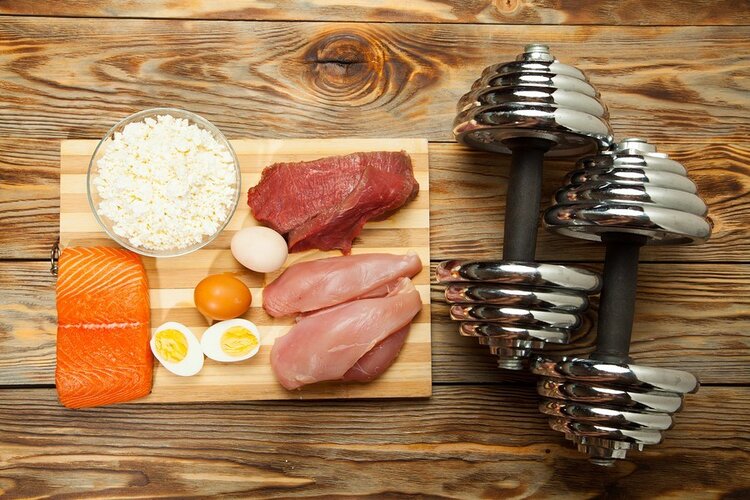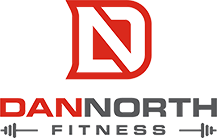1. WHAT’S PROTEIN?
Protein is a macronutrient that is essential to building muscle and getting stronger.
2. WHAT’S A MACRONUTRIENT?
There are three macronutrients that the body uses and requires in daily amounts: protein, carbs, and fats.
3. WHY IS PROTEIN SO IMPORTANT?
In terms of training, it’s one of the most essential ways to help your muscles replenish and grow. When you exercise, you’re actually breaking your body down.
Protein helps your damaged muscle fibers repair so you can actually see the benefits of your hard work in the gym.
4. HOW MUCH PROTEIN DO YOU NEED DAILY?
Depends. If your goal is to build muscle, in the ballpark of 1-1.5g per lbs of body-weight is a healthy daily amount (ex. 200lbs = 200-300g of protein per day). The higher end of this range is pretty ambitious and is better suited for those who are really trying to add size.
For the most part, aiming to have 1g of protein per lbs of body-weight daily is a great way to build muscle, get stronger, and feel better.
5. HOW MUCH PROTEIN DO YOU NEED PER SERVING?
Depends. About 25-30g of protein per meal is always a safe bet.
I’ve had clients say they eat 1 egg for breakfast and are amazed to discover that only has about 5-6g of protein.
6. WHAT IF I DON’T WANT TO TRACK MY PROTEIN?
You don’t have to, but it definitely helps. I usually recommend my clients track their calories and macros every day for at least 30 days. And if they don’t want to continue tracking past the first month, they don’t have to. But at least you have a better understanding of what and how much you’re eating.
On the other hand, if you’d rather not track your food altogether and want something that’s a little less labour-intensive, simply aim to eat a protein source with every meal. For men, about two palms’ worth of protein per meal is recommended. For women, about a palm of protein is great.
7. WHEN SHOULD I EAT PROTEIN?
Aim for every meal. Protein with breakfast is import to help reverse the catabolic effect from sleeping overnight. It also helps you feel fuller longer and maintain consistent energy levels throughout the day.
And of course, before and after your workouts is always recommended for optimal performance and recovery.
8. WHAT ARE SOME GOOD SOURCES OF PROTEIN?
Too many to list for the purpose of this blog. Check out this protein source guide here for more info.
9. WHAT ARE SOME GOOD PLANT-BASED SOURCES OF PROTEIN?
Again, there are plenty. Check out this guide here for high-protein vegan sources.
10. DO I NEED TO HAVE PROTEIN WITHIN 15-30 MIN AFTER MY WORKOUTS?
Bro science will tell you that your gains are diminished if you don’t slam back a protein shake before leaving the gym. Studies show that this isn’t exactly the case.
While you don’t need to have protein immediately after your workout, it’s probably a good idea to have some within 60-90 minutes for optimal recovery.
11. SHOULD I HAVE A PROTEIN SHAKE OR FOOD AFTER MY WORKOUTS?
This is completely up to you. Personally, I like to have a protein shake and banana right after my workouts, and then a meal with some form of meat/fish and rice/potates/veggies a couple hours later.
Again, this is my personal preference. Protein is protein. Just make sure you’re getting it in after training one way or another.
Tip: Have something that your body can break down and use quickly as soon as you can post workout (ex. protein shake). Then an hour or two later, eat something that takes a little longer to digest and break down to help optimize recovery/energy throughout the day.
12. DO I NEED TO DRINK PROTEIN SHAKES?
Nope. Protein is protein. Shakes are just an easy/time-efficient way to get it in.
They’re also a useful way to get your protein in while keeping your calorie intake low if you’re trying to lose fat and stay in a deficit.
13. WHAT’S THE DIFFERENCE BETWEEN WHEY CONCENTRATE AND ISOLATE?
When whey liquid is collected from cheese and yogurt production, it is processed further to increase its protein content. The liquid is then dried to form whey protein powder (80% protein, 20% carbs and fats).
If the whey is processed even further to reduce the amount of fats and carbs, a higher protein whey isolate can be formed (90%).
Concentrate: Some carbs, some fats, less expensive, higher in calories.
Isolate: Less carbs, less fat, more expensive, lower in calories.
Both are great.
14. WILL EATING TOO MUCH PROTEIN MAKE ME FAT?
Eating too many calories (consuming more calories than you’re burning) will add fat (i.e. being in a calorie surplus).
Protein doesn’t add fat, consuming more calories than you’re burning does.
15. WILL PROTEIN MAKE ME BULKY?
Lol…nah. Only if you train hard enough and eat plenty (like, plenty plenty).
Not eating protein or lifting weights because you’re afraid it will make you bulky (sorry ladies but I’m talking to you) is the equivalent of saying you don’t want to read because you’re afraid you’ll turn into Einstein.
I mean, it could happen, but it probably won’t.





